The adverb. The numeral.
The adverb. The numeral.
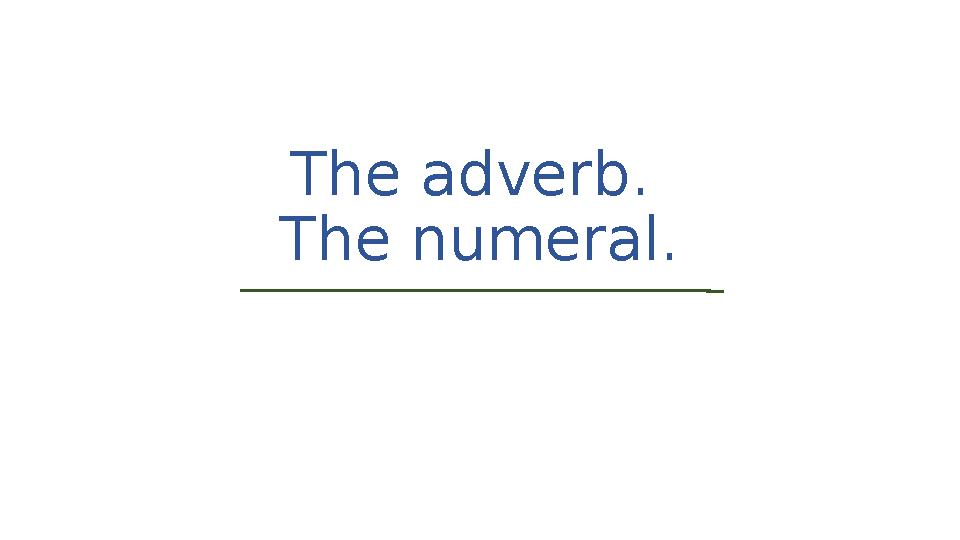

#1 слайд
The adverb.
The numeral.
1 слайд
The adverb. The numeral.
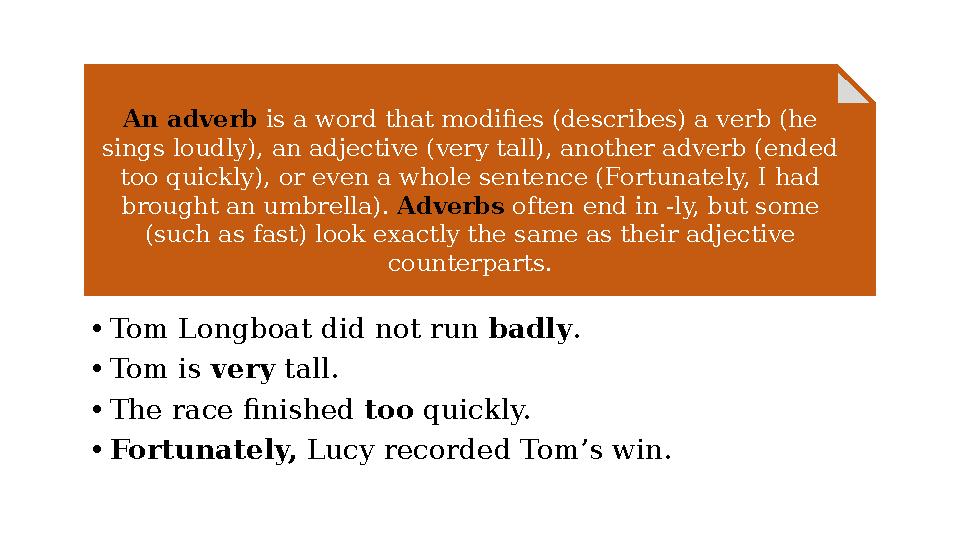
#2 слайд
•
Tom Longboat did not run badly .
•
Tom is very tall.
•
The race finished too quickly.
•
Fortunately, Lucy recorded Tom’s win.An adverb is a word that modifies (describes) a verb (he
sings loudly), an adjective (very tall), another adverb (ended
too quickly), or even a whole sentence (Fortunately, I had
brought an umbrella). Adverbs often end in -ly, but some
(such as fast) look exactly the same as their adjective
counterparts.
2 слайд
• Tom Longboat did not run badly . • Tom is very tall. • The race finished too quickly. • Fortunately, Lucy recorded Tom’s win.An adverb is a word that modifies (describes) a verb (he sings loudly), an adjective (very tall), another adverb (ended too quickly), or even a whole sentence (Fortunately, I had brought an umbrella). Adverbs often end in -ly, but some (such as fast) look exactly the same as their adjective counterparts.
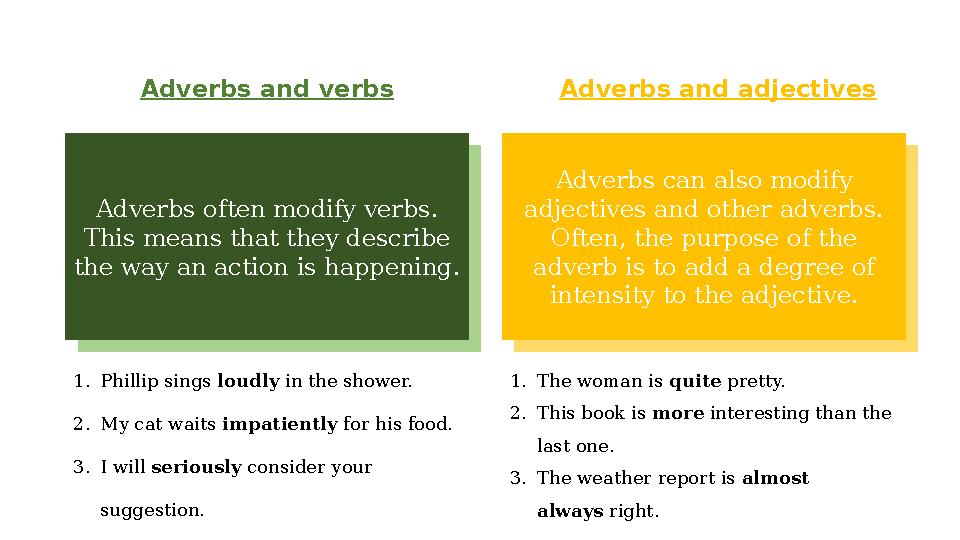
#3 слайд
Adverbs often modify verbs.
This means that they describe
the way an action is happening. Adverbs can also modify
adjectives and other adverbs.
Often, the purpose of the
adverb is to add a degree of
intensity to the adjective.Adverbs and verbs
1. Phillip sings loudly in the shower.
2. My cat waits impatiently for his food.
3. I will seriously consider your
suggestion. Adverbs and adjectives
1. The woman is quite pretty.
2. This book is more interesting than the
last one.
3. The weather report is almost
always right.
3 слайд
Adverbs often modify verbs. This means that they describe the way an action is happening. Adverbs can also modify adjectives and other adverbs. Often, the purpose of the adverb is to add a degree of intensity to the adjective.Adverbs and verbs 1. Phillip sings loudly in the shower. 2. My cat waits impatiently for his food. 3. I will seriously consider your suggestion. Adverbs and adjectives 1. The woman is quite pretty. 2. This book is more interesting than the last one. 3. The weather report is almost always right.
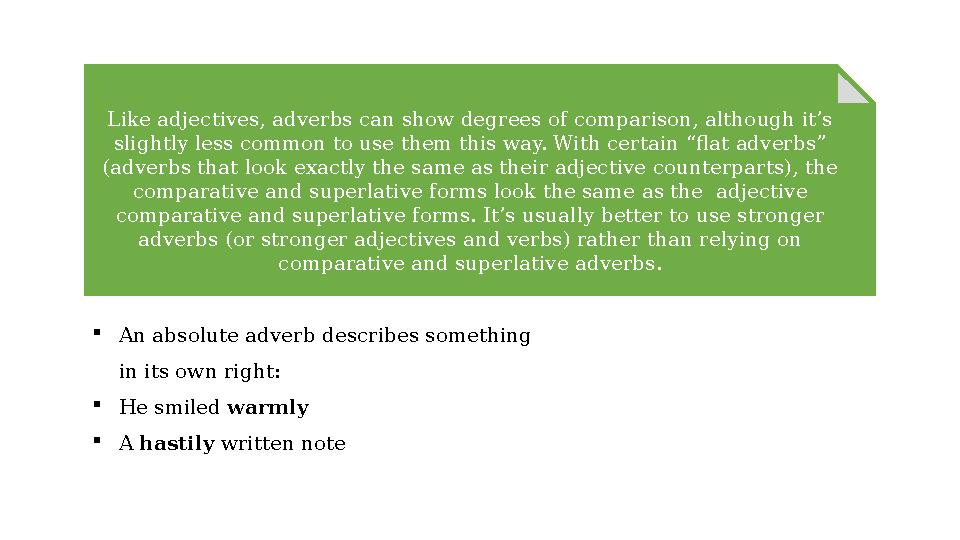
#4 слайд
Like adjectives, adverbs can show degrees of comparison, although it’s
slightly less common to use them this way. With certain “flat adverbs”
(adverbs that look exactly the same as their adjective counterparts), the
comparative and superlative forms look the same as the adjective
comparative and superlative forms. It’s usually better to use stronger
adverbs (or stronger adjectives and verbs) rather than relying on
comparative and superlative adverbs.
An absolute adverb describes something
in its own right:
He smiled warmly
A hastily written note
4 слайд
Like adjectives, adverbs can show degrees of comparison, although it’s slightly less common to use them this way. With certain “flat adverbs” (adverbs that look exactly the same as their adjective counterparts), the comparative and superlative forms look the same as the adjective comparative and superlative forms. It’s usually better to use stronger adverbs (or stronger adjectives and verbs) rather than relying on comparative and superlative adverbs. An absolute adverb describes something in its own right: He smiled warmly A hastily written note
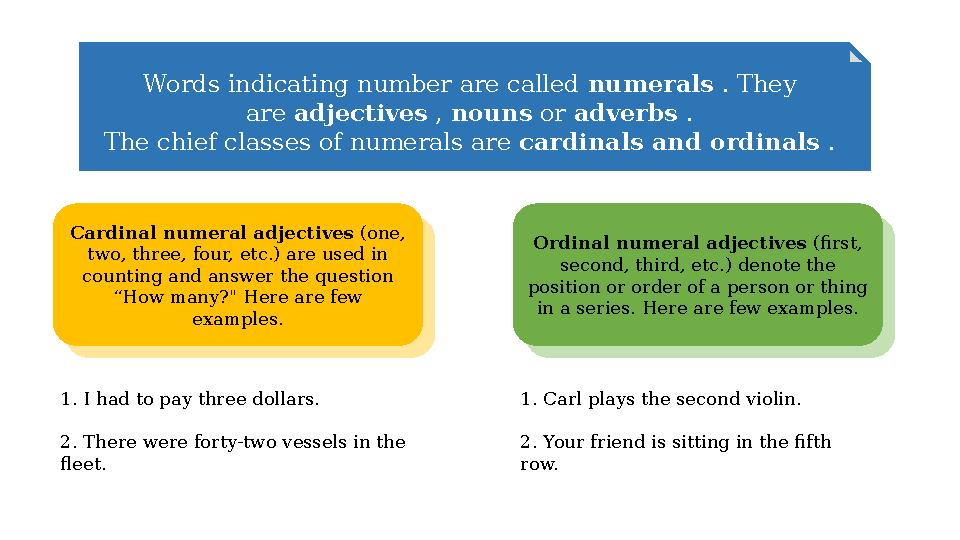
#5 слайд
Words indicating number are called numerals . They
are adjectives , nouns or adverbs .
The chief classes of numerals are cardinals and ordinals .
Cardinal numeral adjectives (one,
two, three, four, etc.) are used in
counting and answer the question
“How many?" Here are few
examples. Ordinal numeral adjectives (first,
second, third, etc.) denote the
position or order of a person or thing
in a series. Here are few examples.
1. I had to pay three dollars.
2. There were forty-two vessels in the
fleet. 1. Carl plays the second violin.
2. Your friend is sitting in the fifth
row.
5 слайд
Words indicating number are called numerals . They are adjectives , nouns or adverbs . The chief classes of numerals are cardinals and ordinals . Cardinal numeral adjectives (one, two, three, four, etc.) are used in counting and answer the question “How many?" Here are few examples. Ordinal numeral adjectives (first, second, third, etc.) denote the position or order of a person or thing in a series. Here are few examples. 1. I had to pay three dollars. 2. There were forty-two vessels in the fleet. 1. Carl plays the second violin. 2. Your friend is sitting in the fifth row.
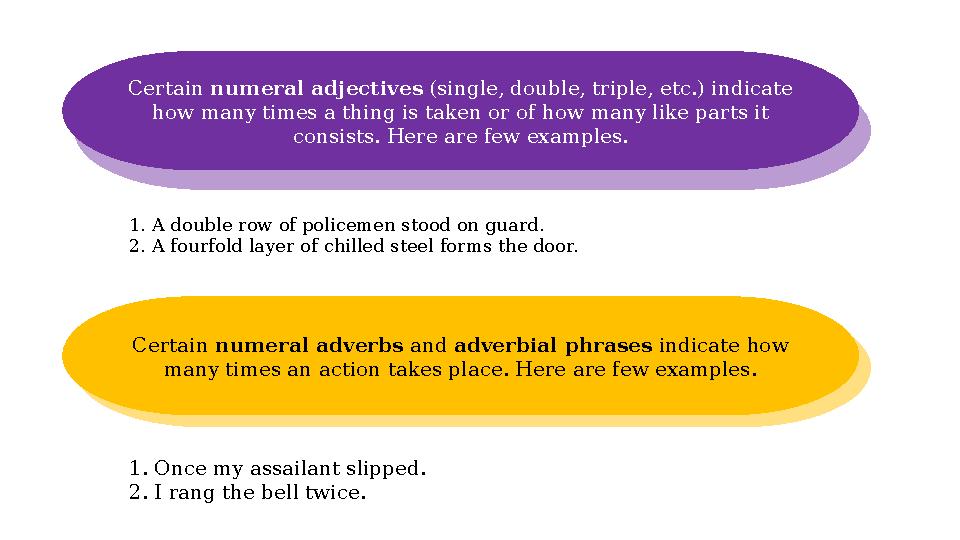
#6 слайд
Certain numeral adjectives (single, double, triple, etc.) indicate
how many times a thing is taken or of how many like parts it
consists. Here are few examples.
Certain numeral adverbs and adverbial phrases indicate how
many times an action takes place. Here are few examples.
1. Once my assailant slipped.
2. I rang the bell twice.1. A double row of policemen stood on guard.
2. A fourfold layer of chilled steel forms the door.
6 слайд
Certain numeral adjectives (single, double, triple, etc.) indicate how many times a thing is taken or of how many like parts it consists. Here are few examples. Certain numeral adverbs and adverbial phrases indicate how many times an action takes place. Here are few examples. 1. Once my assailant slipped. 2. I rang the bell twice.1. A double row of policemen stood on guard. 2. A fourfold layer of chilled steel forms the door.

шағым қалдыра аласыз
















